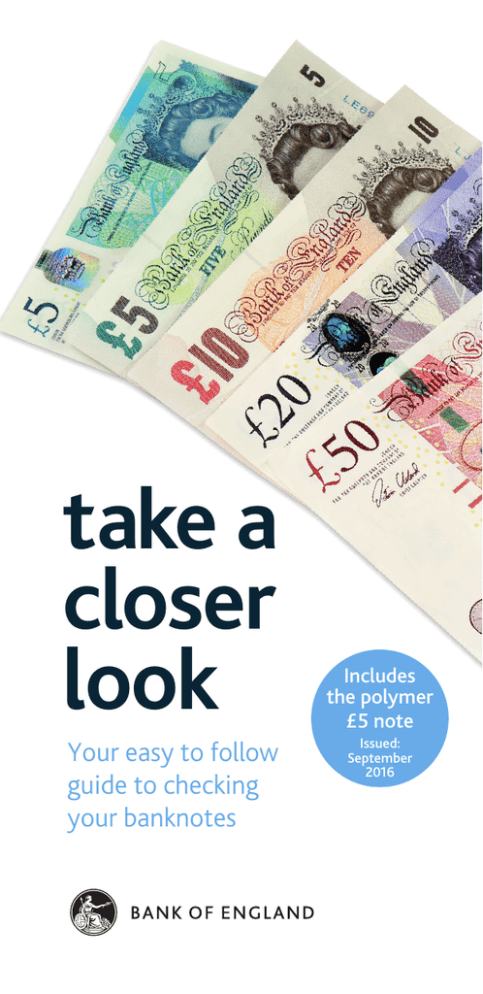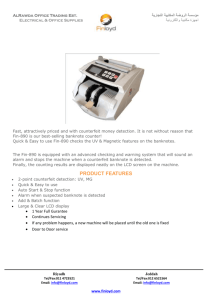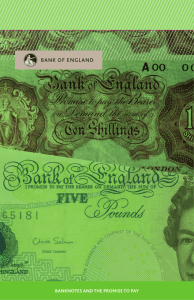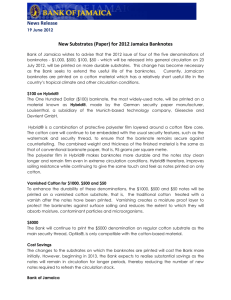Take A Closer Look Booklet
advertisement

take a closer look Your easy to follow guide to checking your banknotes Includes the polymer £5 note Issued: September 2016 INTRODUCTION Maintaining confidence in the currency is a key objective of the Bank of England, and you too can play a role. This easy to follow guide, along with our app, has been produced to help cash users identify genuine Bank of England banknotes. Counterfeit banknotes are rare, but our advice is to remain vigilant at all times: ‘take a closer look’ at banknotes as they are being passed in payment and use the security features to check that banknotes are genuine. When checking banknotes, it is best not to rely on just one feature, but to check a few of those described in this guide. Look at the banknote closely; if you have any doubts compare it to one that you know is genuine. Victoria Cleland Director of Notes, Chief Cashier 1 GENERAL ADVICE When should I check banknotes? It is a good idea to check your banknotes whenever you receive them. It is especially important to be careful in situations where you cannot see the notes clearly. What features should I check? This booklet gives details of the security features on each of our notes. You should check the features which are specific to each denomination, such as the see-through window on the new polymer £5 notes, the metallic thread and watermark on the paper £5 and £10 notes, the holographic strip on the £20 note and the green motion thread on the £50 note. What should I do if I think I have a counterfeit note? Counterfeit notes are worthless. It is a criminal offence to knowingly hold onto or pass on counterfeit notes. If you suspect a note is counterfeit, take it to the police as soon as possible. They will give you a receipt and send the note to the Bank of England for analysis. If the note is genuine, you will be reimbursed. What type of ultra-violet (UV) lamp should I use to check a banknote is genuine? A UV lamp that emits light at around 365 nanometres is ideal for checking the fluorescent features on all notes. We advise against using LED (Light Emitting Diode) devices, such as key-fob style detectors, as these often emit light above 365 nanometres. Can I use a detector pen to check whether a banknote is genuine? The pens work by reacting with the starch that is present in ‘normal’ paper. So, whilst they can detect some (but not all) counterfeits printed on paper, they won’t detect counterfeits that are printed on polymer. Be careful as old or dirty pens can be unreliable. 2 BANKNOTE SIZES Banknotes get slightly larger as they increase in value, so a £10 note is bigger than a £5 note and so on. Polymer £5 – approx 125mm x 65mm Paper £5 – approx 135x70mm Paper £10 – approx 142x75mm Paper £20 – approx 149x80mm Paper £50 – approx 156x85mm 3 POLYMER BANKNOTES You can find information on the new polymer £5 note and its security features in this booklet. Polymer is a thin and flexible plastic material. Our polymer notes provide enhanced counterfeit resilience, and increase the quality of notes in circulation. The paper £5 note will be withdrawn from circulation in May 2017, before the new polymer £10 note is introduced in summer 2017. The next £10 and £20 notes The polymer £10 note will be issued in summer 2017. It will feature Jane Austen and will be 132mm x 69mm. The polymer £20 note will be issued by 2020. It will feature JMW Turner and will be 139mm x 73mm. The Bank of England will make a decision on when to issue a new £50 note, and whether to print it on polymer, in due course. For further information: www.bankofengland.co.uk/banknotes/polymer 4 POLYMER BANKNOTES As with any change in banknote design, all businesses that handle cash will need to plan and prepare for the introduction of the new, smaller polymer notes. Retailers who handle cash will need to be able to recognise and authenticate the new notes, and some handling practices may need to be adapted. Below are some frequently asked questions to help you in the transition. Are polymer notes easy to handle? Yes. Polymer notes feel different from paper notes but they can be handled just as easily. Do polymer notes stick together? Brand new polymer notes, like paper notes, can sometimes stick together but this effect is short-lived once in use. New notes can be fanned or tapped on a desktop surface to make them easier to count by hand or machine. Can I use my banknote checking/counting machines with polymer notes? Yes, although they will need to be adapted for the new notes. You should engage directly with your machine manufacturer or supplier to discuss what adaptations will be required. When purchasing new machines ask the supplier if they are capable of checking and counting paper and polymer notes. If your business uses check-weighing devices to count notes, you will need to separate paper and polymer £5 notes before weighing them. This is because paper notes weigh slightly more than polymer notes. How should I open packets of new notes? Avoid using sharp objects such as knives and scissors to open packets of new notes. Whilst polymer notes are more durable, they can tear quickly if they are nicked. Less sharp objects such as letter openers can be used as an alternative. 5 POLYMER BANKNOTE 5 7 10 1 2 3 8 4 7 9 1 Check the see-through window There is a large see-through window on the note. A clearly defined portrait of the Queen is printed on the window with the words ‘£5 Bank of England’ printed twice around the edge. A finely detailed metallic image of the Elizabeth Tower is positioned over the window. The foil is gold on the front of the note and silver on the back of the note. When the note is tilted a multicoloured rainbow effect can be seen. 2 Around the edge of the window is a coloured border which changes from purple to green when the note is tilted. The £ symbol in the window also changes from purple to green. This effect can be seen on the front and back of the note. 3 4 Check the foil patches On the front of the note, below the see-through window, is a silver foil patch. When the note is tilted the word ‘Five’ changes to ‘Pounds’ and a multicoloured rainbow effect can be seen. On the front of the note, above the see-through window, is a silver foil patch containing an image of the coronation crown which appears 3D. When the note is tilted a multicoloured rainbow effect can be seen. 5 6 front back front back £5 Issue date 13 September 2016 6 3 6 On the back of the note, there is a circular green foil patch which contains the word BLENHEIM. It is immediately behind the crown on the front. 7 Check the polymer and the raised print The note is printed on polymer which is a thin and flexible plastic material. By running your finger across the front of the note you can feel raised print in areas such as the words ‘Bank of England’ and in the bottom right corner, around the number 5. 8 Check the print quality The printed lines and colours on the note are sharp, clear and free from smudges or blurred edges. clear blurred close up magnified 9 Check the microlettering Using a magnifying glass, look closely at the lettering beneath the Queen’s portrait – you will see the value of the note written in small letters and numbers. 10 Check the ultra-violet feature If you look at the front of the note under a good quality ultra-violet light, the number 5 appears in bright red and green whilst the background remains dull in contrast. 7 PAPER BANKNOTE 3 7 6 2 5 1 Check the metallic thread There is a metallic thread embedded in every paper banknote. This appears as silver dashes on the back of the note. If you hold the note up to the light the metallic thread will appear as a continuous dark line. 2 Check the watermark Hold the note up to the light and you will see an image of the Queen’s portrait. front back clear blurred 3 Check the paper and the raised print The note is printed on special paper that gives it its unique feel. By running your finger across the front of the note you can feel raised print in areas such as the words ‘Bank of England’. 4 Check the print quality The printed lines and colours on the note are sharp, clear and free from smudges or blurred edges. 8 £5 1 4 2 5 Check the microlettering Using a magnifying glass, look closely at the lettering beneath the Queen’s portrait on the note – you will see the value of the note written in small letters and numbers. close up magnified 6 Check the ultra-violet feature If you look at the front of the note under a good quality ultra-violet light, the number 5 appears in bright red and green whilst the background remains dull in contrast. 7 Check the hologram There is a hologram on the foil patch on the front of the note. If you tilt the note, the image will change between a brightly coloured picture of Britannia and the number 5. The paper £5 note will be withdrawn from circulation in May 2017. For further information visit our website: www.bankofengland.co.uk/banknotes 9 PAPER BANKNOTE 3 7 6 2 5 1 Check the metallic thread There is a metallic thread embedded in every paper banknote. This appears as silver dashes on the back of the note. If you hold the note up to the light the metallic thread will appear as a continuous dark line. 2 Check the watermark Hold the note up to the light and you will see an image of the Queen’s portrait. front back clear blurred 3 Check the paper and the raised print The note is printed on special paper that gives it its unique feel. By running your finger across the front of the note you can feel raised print in areas such as the words ‘Bank of England’. 4 Check the print quality The printed lines and colours on the note are sharp, clear and free from smudges or blurred edges. 10 £10 1 4 2 5 Check the microlettering Using a magnifying glass, look closely at the lettering beneath the Queen’s portrait on the note – you will see the value of the note written in small letters and numbers. close up magnified 6 Check the ultra-violet feature If you look at the front of the note under a good quality ultra-violet light, the number 10 appears in bright red and green whilst the background remains dull in contrast. 7 Check the hologram There is a hologram on the foil patch on the front of the note. If you tilt the note, the image will change between a brightly coloured picture of Britannia and the number 10. 11 PAPER BANKNOTE 3 6 8 2 4 3 7 5 1 Check the metallic thread There is a metallic thread embedded in every paper banknote. This appears as silver dashes on the back of the note. If you hold the note up to the light the metallic thread will appear as a continuous dark line. 2 Check the watermark Hold the note up to the light and you will see an image of the Queen’s portrait together with a bright £20. front back clear blurred close up magnified 3 Check the paper and the raised print The note is printed on special paper that gives it its unique feel. By running your finger across the front of the note you can feel raised print in areas such as the words ‘Bank of England’ and in the bottom right corner, around the number 20. 4 Check the print quality The printed lines and colours on the note are sharp, clear and free from smudges or blurred edges. 5 Check the microlettering Using a magnifying glass, look closely at the lettering beneath the Queen’s portrait on the note – you will see the value of the note written in small letters and numbers. 12 £20 8 1 6 2 6 Check the ultra-violet features If you look at the front of the note under a good quality ultra-violet light the number 20 appears in bright red and green. Randomly spread bright red and green flecks are also visible on both the front and back of the note. The remainder of the note appears dull in contrast. close up magnified 7 Check the holographic strip The strip on the note has a number of foil patches along its length which contain alternating holographic images. The positioning of the patches varies along the strip. When the note is tilted, one hologram shows a multi-coloured image of Adam Smith, the other changes between a multi-coloured £ symbol and the number 20. The number 20 is also embossed on the strip and is positioned in the same place on every note – just to the right of the signature of the Chief Cashier. embossed 20 8 Check the see-through register Hold the note up to the light and you will see coloured irregular shapes printed on the front and back that combine to form the £ symbol. seen from front back shapes added 13 PAPER BANKNOTE 3 6 8 1 2 4 3 7 5 1 Check the metallic thread There is a metallic thread embedded in every paper banknote. If you hold the note up to the light the metallic thread will appear as a continuous dark line. seen from front held up to light front back clear blurred close up magnified 2 Check the watermark Hold the note up to the light and you will see an image of the Queen’s portrait together with a bright £50. 3 Check the paper and the raised print The note is printed on special paper that gives it its unique feel. By running your finger across the front of the note you can feel raised print in areas such as the words ‘Bank of England’ and in the bottom right corner, around the number 50. 4 Check the print quality The printed lines and colours on the note are sharp, clear and free from smudges or blurred edges. 5 Check the microlettering Using a magnifying glass, look closely at the lettering beneath the Queen’s portrait on the note – you will see the value of the note written in small letters and numbers. 14 £50 8 6 2 6 Check the ultra-violet features If you look at the front of the note under a good quality ultra-violet light the number 50 appears in bright red and green. The motion thread also appears bright green and randomly spread bright red and green flecks are visible on both the front and back of the note. The remainder of the note appears dull in contrast. 7 Check the motion thread The motion thread on the note is woven into the paper. It appears five times on the front of the note showing images of the £ symbol and the number 50. When the note is tilted from side to side, the images move up and down. When the note is tilted up and down, the images move from side to side and the number 50 and £ symbol switch. 8 Check the see-through register Hold the note up to the light and you will see coloured irregular shapes printed on the front and back that combine to form the £ symbol. seen from front back shapes added 15 FURTHER INFORMATION Exchanging withdrawn Bank of England banknotes Old series Bank of England notes retain their face value for all time and can be exchanged with the Bank of England. For further information visit our website: www.bankofengland.co.uk/banknotes/about/exchanges Damaged and mutilated banknotes The Bank of England’s Mutilated Note Service exists to reimburse holders of Bank of England banknotes, at full face value, for genuine notes that have become damaged, providing there are sufficient fragments or remains. As a general rule there should be evidence of at least half a banknote. For further information visit our website: www.bankofengland.co.uk/banknotes/damaged_banknotes Framework for the testing of automatic cash handling machines The Bank of England encourages manufacturers of machines that automatically authenticate, accept or sort banknotes to test their machines capabilities at the Bank of England. Re-testing is required annually and successful machines are listed on our website. The framework helps to maintain a high level of confidence in Bank of England banknotes and allows companies that own or use such equipment to make informed choices about the equipment they use/ buy. For further information visit our website: www.bankofengland.co.uk/banknotes/retailers/framework Dye stained banknotes Cash in transit robberies continue to be a problem in the UK. To make this a less attractive crime the Bank of England works with the cash industry to promote the use of dye staining devices in cash boxes so that stolen notes are easily recognisable. For further information visit: www.banknotewatch.org 16 COUNTERFEIT PREVENTION Free education materials In addition to this booklet, the Bank of England provides a range of training and educational materials about banknotes and their security features. These include: leaflets, posters, z-cards, an app (Bank of England banknotes), online films and online training which incorporates a short test. There are also dedicated pages on our website, visit: www.bankofengland.co.uk/banknotes take a closer look - £5 polymer banknotes Issue date 13 September 2016 For further information Tel: 020 7601 4878 Email: enquiries@bankofengland.co.uk www.bankofengland.co.uk/banknotes M SP EC I EN IM SP EC the see-through window and the clearly defined portrait • Check of the Queen • Check the Elizabeth Tower is gold on the front and silver on the back the coloured border around the window changes from purple • Check to green Check • the foil patch changes from ‘Five’ to ‘Pounds’ • Check the coronation crown appears 3D Check the word BLENHEIM is printed clearly in the circular green foil • patch on the back of the note. • Check the feel of the polymer and the raised print • Check the quality of the printing • Check the microlettering • Check the ultra-violet feature EN Follow the simple checklist to check that your polymer banknotes are genuine. Remember, do not rely on just one feature, check a few. © The Governor and Company of the Bank of England 2016: Banknotes can only be produced in accordance with the Bank of England’s Reproduction Terms and Conditions. TACL7A5 Helping to prevent counterfeit crime If you have any information relating to the production, distribution or passing of counterfeit notes please contact the charity Crimestoppers. You will not have to reveal any personal details, make a statement or appear in court. If your information leads to an arrest and charge, you may be eligible for a cash award of up to £1,000. Your identity will not be revealed on collection of such an award. The process is explained by the call handlers at Crimestoppers. Give Information Via phone: 0800 555 111 Via the Anonymous Online Form: www.crimestoppers-uk.org 17 Promoting the good of the people of the United Kingdom by maintaining monetary and financial stability. For further information Tel: 020 7601 4878 Email: enquiries@bankofengland.co.uk www.bankofengland.co.uk/banknotes Public Enquiries Group, Bank of England, Threadneedle Street, London EC2R 8AH This booklet is available in Welsh. © The Governor and Company of the Bank of England 2016. Banknotes can only be reproduced in accordance with the Bank of England’s Reproduction Terms and Conditions. TACLB5


